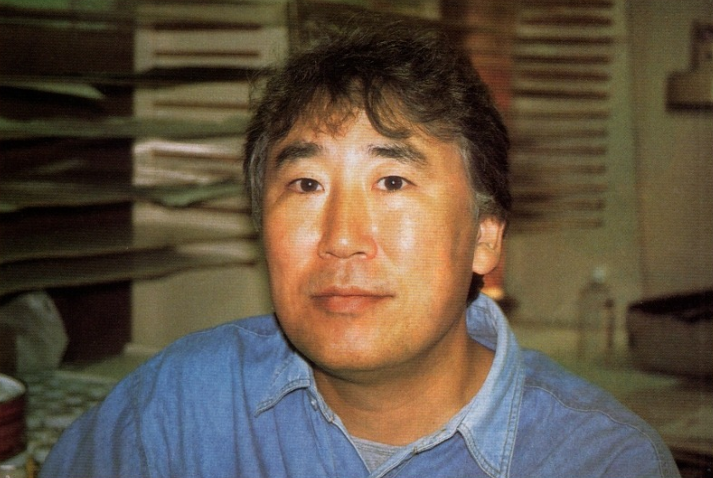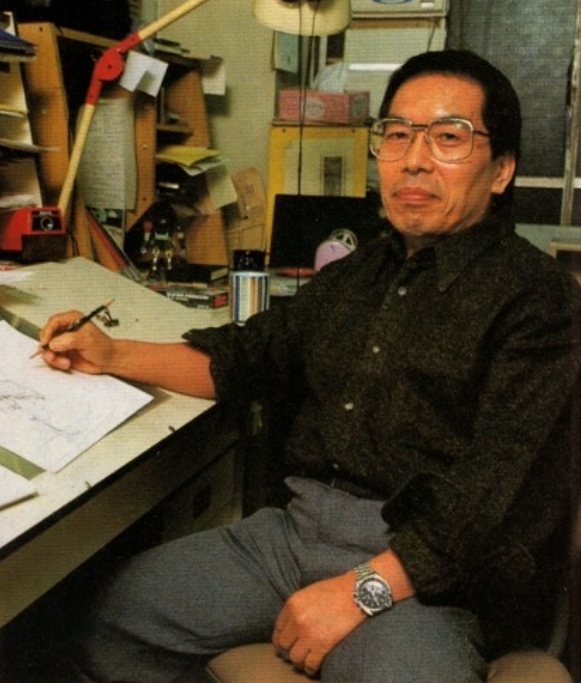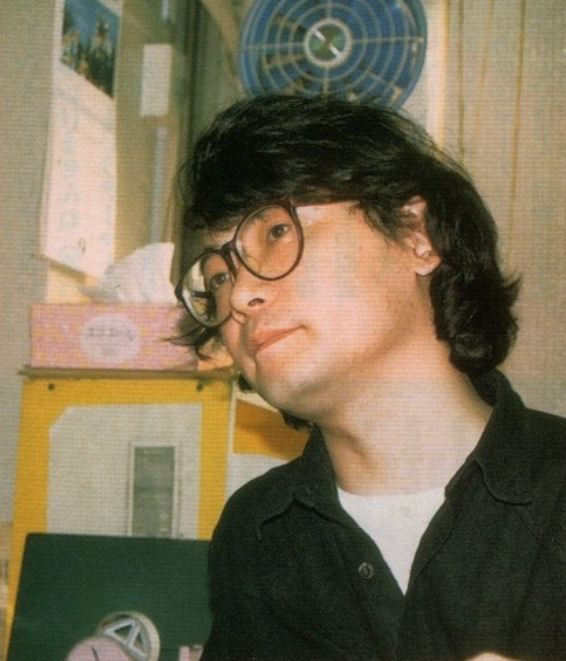

■ I don't like robot stuff
――I have never done any robot stuff at all until "Dougram". I had casually said in public that I didn't
really like robot stuff. Also, I never thought about directing animation as a career.
One reason I didn't consider it was because of my talent, and I didn't think I was suited for directing.
Around the time of "Dougram," I was looking for a career that would suit me in a different field. So I had
no intention of doing a robot thing, but when I saw "Gundam," I realized that it would be difficult to
create something new in a field that had come so far. I was a little intrigued by the idea of doing a robot
project while thinking about it, and then Mr. Yamaura, the current president of Sunrise, took advantage of
my interest (laughs).
■ The Resistive Element of the Story: The Search for a Robot's Raison d'etre
――I started working on "Dougram" as a completely different project, but I was willing to destroy it and
start over from scratch. I joined Mushi Productions as a director, but because of the presence of such great
members as Dezaki Osamu, I tried to stay away from directing work as much as possible. But with "Dougram," I
realized how interesting it was to be able to create my own original stories. But I did my own stories for
"Zero Tester"
and "Cyborg 009," so I guess I had an original orientation without realizing it. Well, with "Dougram," I got
hooked on
the idea of creating an original story, from the characters to the settings and everything.
However, I had a lot of trouble in the planning stage in integrating the story I wanted to tell with the
robot. Why was a robot
necessary for the story? I knew it was necessary for the merchandising, but it took me a long time to
convince myself. I think that
is how the AT in "VOTOMS" and the human vs. AT in "Mellowlink" were derived.
■ Ideas that come to me because I like things normally
――I also came up with the detailed movements and molding of the AT of VOTOMS. The turret lens of the AT is
like the turret of a microscope I wanted when I was a child. The arm punch mechanism is also like a
pile-driver
of civil engineering equipment. The origin of "VOTOMS" is also a jeep. When you think of combat vehicles,
you
usually think of tanks. When I was a boy, right after the war, jeeps were a threat. One day I saw a picture
of
a pile of discarded jeeps after the war. Nowadays, four-wheel-drive car races are commonplace, but there
used
to be amateur jeep races. In the same way, they would take care of the discarded combat robots that abounded
in
the city, and engage in mock combat. It's not a major sport by any means; they would load the ATs into
trailers,
do some battling, and then go on the road again. I was inspired by the American movie "Junior Bonner."
I liked science fiction and the like to the degree that normal boys like it. I don't know anything above the
normal level.
I didn't see much war stuff, either WWI or WWII. My father was killed in New Guinea. So I knew nothing about
it. When I
think of war, I think of my own movie experience or after the Vietnam War. I am not particularly attached to
animation either,
so if I were to compete with people who like animation, I would lose if I only liked animation. Therefore, I
try to incorporate
realistic and unsophisticated elements rather than sci-fi ones. My basic approach is to bring in ideas that
are not found in
animation as much as possible.
■ Sons challenging fatherly presence
――Until "Dougram," I had no idea what I wanted to do. I think it was "Father and Son" that I wanted to do
when I was given the materials for "Dougram" and created the story.
The same is true of the relationship between Weissman and Chirico in "VOTOMS." The enemy, Marder, in
"Galient" is already a father.
But that was not the case in the beginning of "VOTOMS." Weissman was originally an enemy to be defeated, and
as the trailer narrates, Chirico is a needle that has entered Weissman's body. The story is about how the
needle finally pierces his heart. However, I think there may have been something in my consciousness that
ultimately led me back to the father wall that needed to be crossed. And I have no experience of fatherhood,
so I guess that's the flip side of it.
■ "Brilliantly Shining Heresy" hangs the inevitability of Chirico's awakening in the air
――I have to make excuses for not depicting things after the 52 episodes, which I have been saying all this
time (laughs).
Apart from the theme of "father and son," I also like the theme of "religion." But I don't believe in any
established religion, nor am I a member of any religious group. Rather than depicting religion, I want to
depict the people around religion, whether it exists or not. Like Weissman's secret society in "Votoms." In
"Brilliantly Shining Heresy," Chirico's enemy is a religious group called Martial, but he doesn't believe in
religion at all. It is a power structure. Chirico is the one whom Martial fears the most. Chirico is an
individual, but he is a man who performs miracles, and since the group already has no miracles, there is no
other choice but to destroy Chirico.
Although not directly related to religion, there are many natural mechanisms that have a strange integrity.
For example, salmon go upstream only to lay eggs, but when they die after laying them, the nutrients that
flowed out to the sea are returned to the mountains. Who thought of this? I am always interested in the
coincidences and mechanisms that do not fit into the framework of natural science. For the past 10 years, I
have been obsessive about the existence of something beyond human understanding.
In "Heresy," there is some kind of inevitability to why Chirico wakes up 30 years later that even he does
not understand. I want to make it something that reeks of that far-fetched logic.

Born on March 28, 1940. After working at Hatena Productions and OH Productions, he joined Sunrise. He became a character designer for "Daitarn 3" and chief animation director for "Dougram."
I first worked with Ryousuke on "Fang of the Sun Dougram." Until then, we had only had dinner at the
same
table once during a consolation trip, but we had almost no contact with each other before "Dougram".
We
were
also close in age, and Ryousuke liked to drink. So the three of us, Kanda (Takeyuki) and I, would
drink
every day. We enjoyed working, of course, but we also enjoyed drinking after work every day. I guess
that's
how our personal relationships grew beyond work.
We were all young at the time, so when alcohol was added to the mix, we were arguing fiercely, but
he
was a
lively, positive person, and I was a quiet person. In retrospect, I think we got along well because
of
our
contrasting personalities. If both of us had been positive, I don't think we would have had such a
long
relationship.
What impressed me the most when I first met him was, and still does, that I have a tendency to be
very
lax,
but in his case, I think he is a very sincere person who takes an interest in things, thinks about
each
thing carefully, and explains it all to me. That is why he sometimes work too hard and over-extend.
I
think
it is because he tend to put himself out there too much without deceiving, when it would be easier
if he
just fooled around in some ways.
I think there is a kind of craziness or madness involved in making something, but I guess Ryousuke
is
not
very good at that kind of thing.
Then, when I think about how he is in terms of his characteristics as a creator, when something is
given
in
front of him, it is as if his sense of touch begins to move there for the first time. The ability to
select
the most appropriate object from those placed in front of him. I think he has a very good sense of
touch.
Ryousuke is a man who has a very good producer's sense and is very good in external scuffles. He has the
qualities of a general, which is why we call him "General." In Tomino (Yoshiyuki)'s case, he is a person
with a sense of speed, so he is the type who can look at the whole picture quickly, give advice swiftly,
and take charge. And in Ryousuke's case, I guess I could say he is a general sitting on top of the hill
and watching, or rather, he's a flag. A banner. I am trying my best to make films as the Ryousuke brand.
That doesn't mean he doesn't do anything, but we don't miss a single word he says over a drink as we
work. He is a total general. It's good to have him around, but he's someone we can't do without.
Ryousuke has the ability to make others do the work or adopt others' opinions as good ones, so he
doesn't do any work (laughs). When asked to make a decision quickly, he does nothing, so when those
around him get fed up and ask him how he likes it, he says, "I think this is good." Ryousuke may have
thought so, but it turned out to be a group effort. It is not about who you are, but about the "Ryosuke
group." This is something that can only be done with a great deal of broad-mindedness, and he is a good
liar and fraudster (laughs). But he has the ability to use people well by praising and scolding them,
and the physical strength to win a fight, and he has become amicable now, but he used to be a street
fighter (the editorial staff was astonished). Please ask him directly what kind of rowdy person he used
to be.
Ryousuke is the person who best understands that films are made by a group of people, and he is the
general who can successfully operate a group of people. He is not a man of character, and even though I
think he is a fraudster and a bad guy, there are people who you can't hate even if they con you. He has
that kind of cute side, and that is why people don't call him "Director Takahashi" but "Mr. Ryousuke."
He truly is a man who has the capacity of a supreme commander.

Born in Osaka in 1957. After joining Sunrise, he worked as a production assistant before becoming a director. He was in charge of storyboarding and unit directing for the "City Hunter" series and other series. Directed the OVA "Gundam 0083."
special thank you to Windii for the translation, and animage on tumblr for the original scans for this translation, which you can view here.
